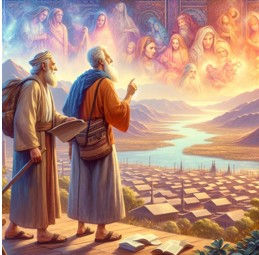Reflection by The Rev'd Dr Deborah Broome
- Jun 12, 2025
- 2 min read
This Sunday is Trinity Sunday
“I still have many things to say to you, but you cannot bear them now. When the Spirit of truth comes, he will guide you into all the truth, for he will not speak on his own but will speak whatever he hears, and he will declare to you the things that are to come. He will glorify me because he will take what is mine and declare it to you. All that the Father has is mine. For this reason I said that he will take what is mine and declare it to you".
John 16:12-15
Here Jesus who speaks (as so often in John’s Gospel) for the Father describes the work of the Holy Spirit, who guides us into truth. The early church – drawing on passages from the Bible like this – insisted that God is Trinity, because this says something profound about the love that exists at the heart of God, and how our lives can be different when we enter into this love. The Trinity is at the heart of Christian faith.
It’s easy to overcomplicate the Trinity – or to do the opposite and oversimplify things. To come up with various analogies, as people have done over the years – St Patrick’s shamrock or clover, the water/ice/steam analogy, but they all have something wrong with them. So let’s not go there. (But if you want to, do check out this lovely piece of Lutheran satire: St Patrick’s Bad Analogies https://www.youtube.com/watch?v=KQLfgaUoQCw )
Trinity reminds us that at the heart of God is community. This is what “one God in three persons” means: that at the centre of what we hold to be the most important thing there is, is relationship. The relationship that exists between the Father, the Son and the Holy Spirit: where each of them doesn’t exist as an isolated individual, but lives in relation to the others. The love that’s at the centre of God wants to include others. The God who is Father, Son and Holy Spirit isn’t a holy huddle but reaches outwards, and so we also are called to reach beyond ourselves to others.
And this is the difference that the Trinity makes for our Christian life today, for it keeps us facing outwards, seeking to draw others into relationship. Not just the relationship we have with God, but also the relationship that is within God. We seek to draw others into the relationship within God, just as we seek to enter more fully into this ourselves.




Comments